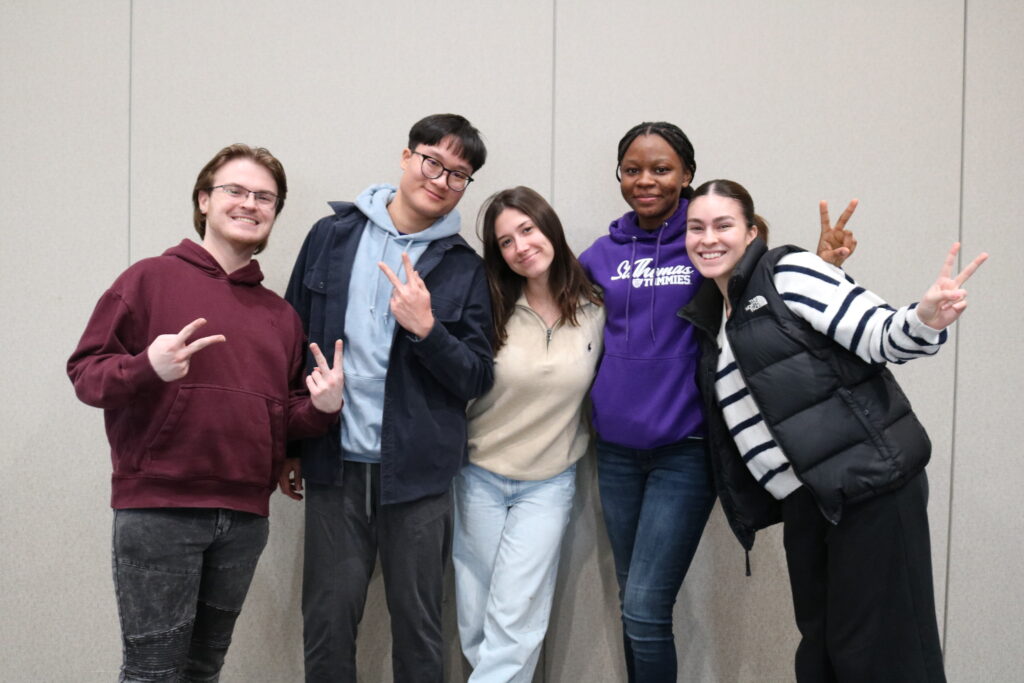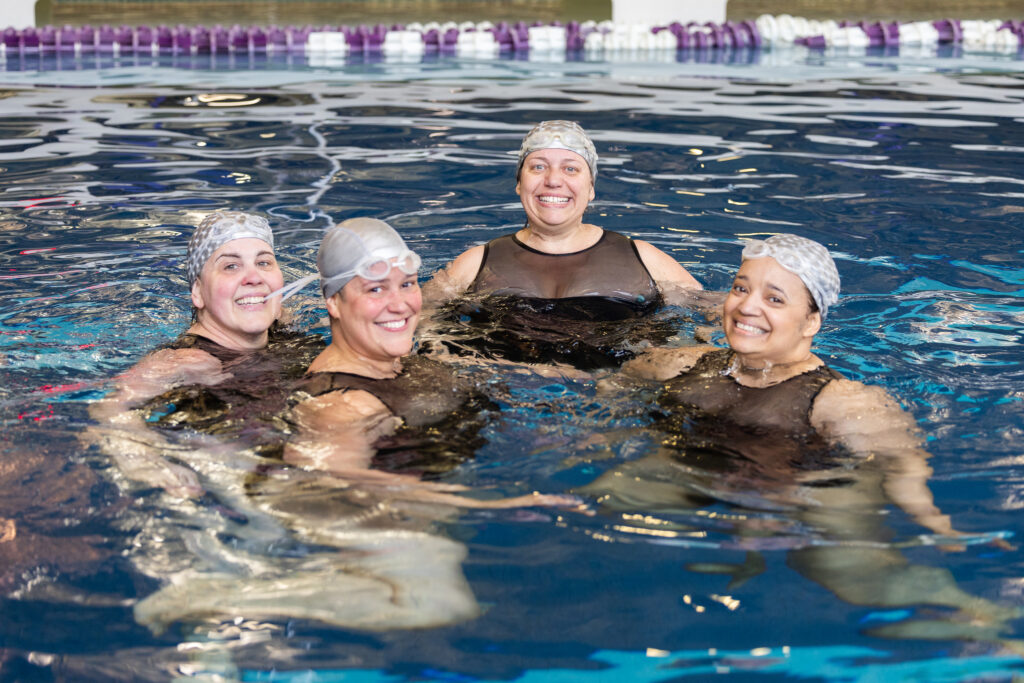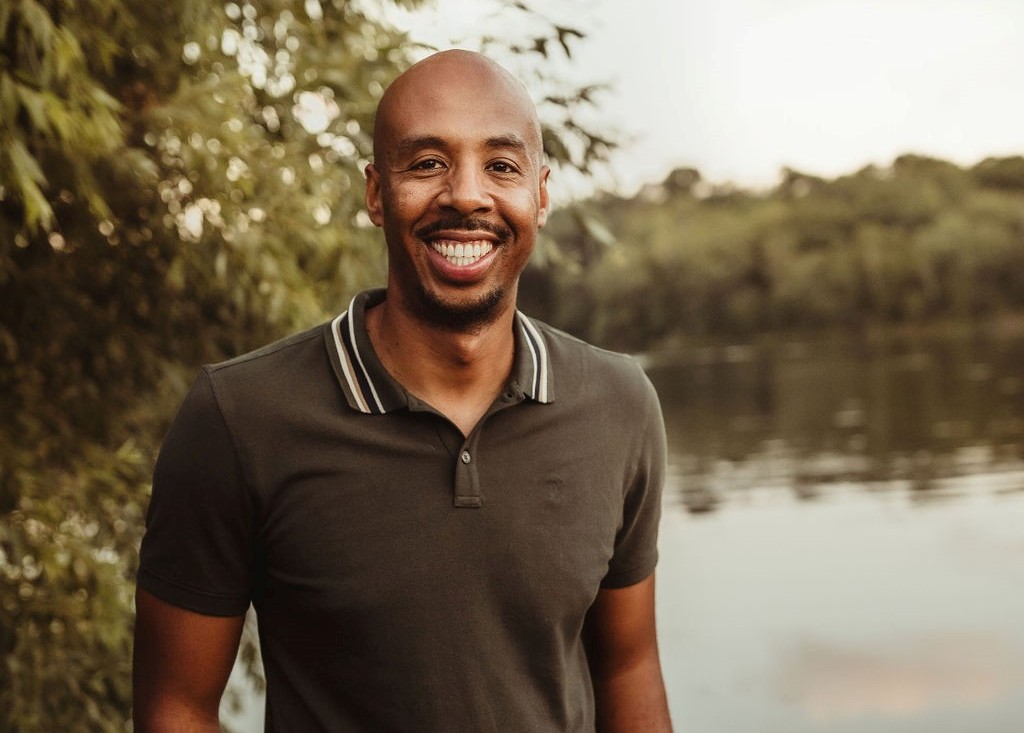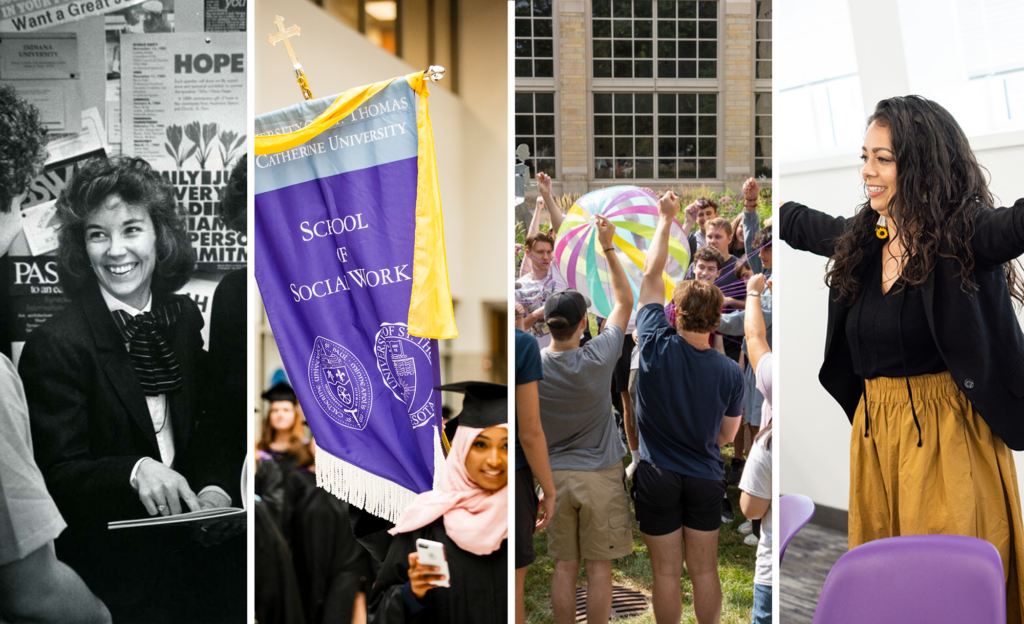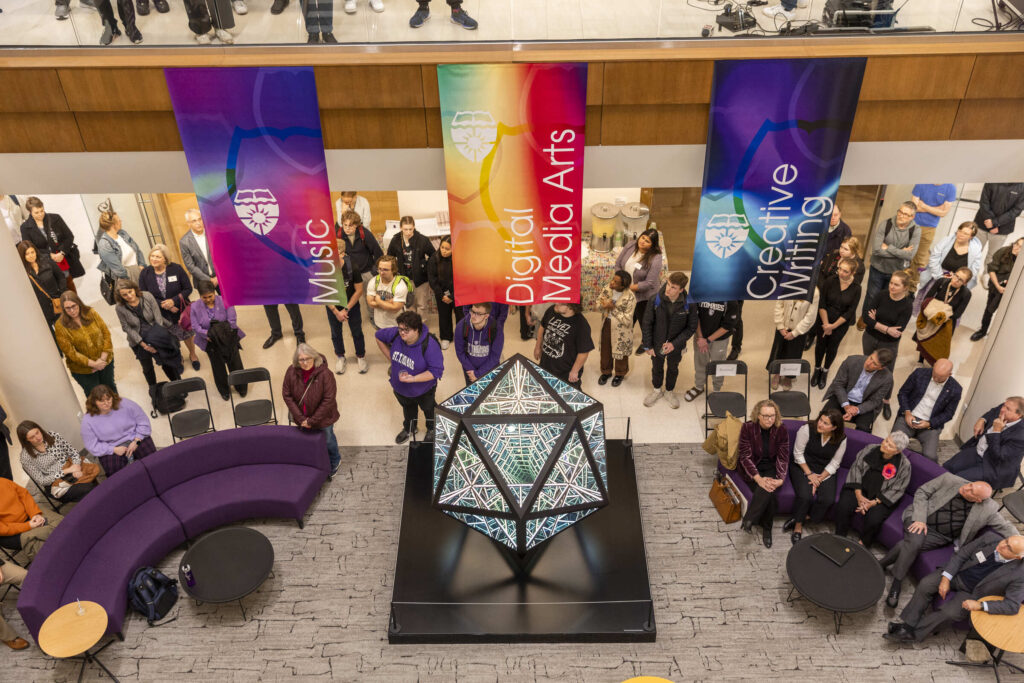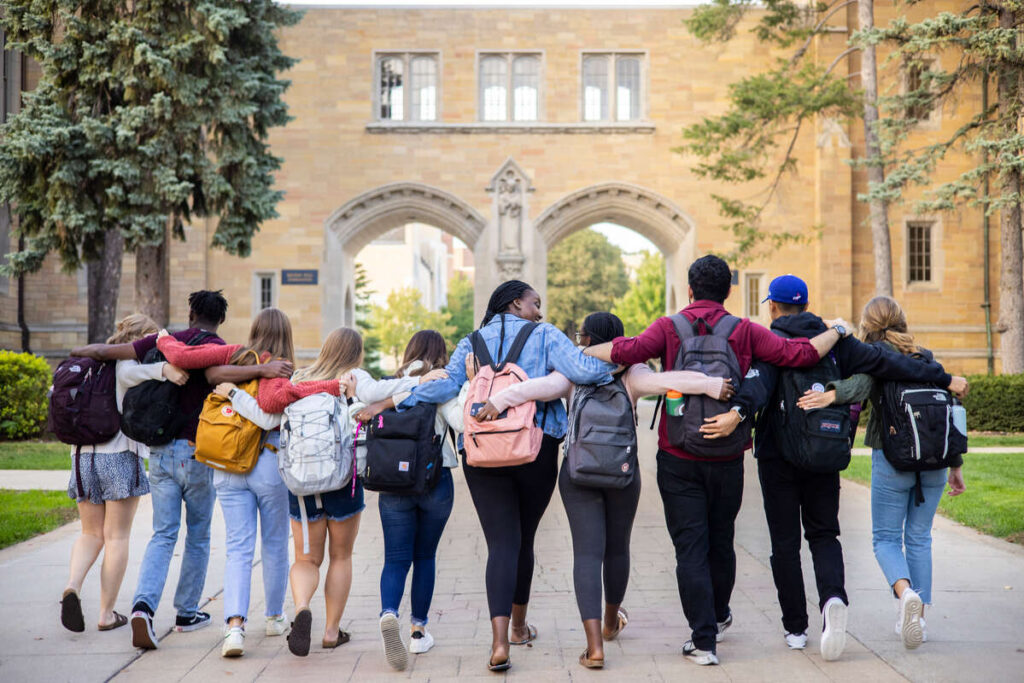St. Thomas will have more counselors available this year. Steve Maurer is a well-known resource to faculty on campus, perhaps too well known. As director of Counseling and Psychological Services, he has seen a steady increase in the need for counseling on campus.
“I’m thinking of an example,” he said. “I consulted with a faculty member who was working with a student – a really good student – who was struggling and performance was dipping. The student came in during office hours to talk about the academic performance, and the student ended up talking about significant family problems. Dad was abusing alcohol heavily; finances were really, really a pressure for the student; the student didn’t know if she would be able to stay at St. Thomas. The student also talked about being depressed and having thoughts of suicide … The faculty member did a really good job of supporting that student in the moment and making a referral to us.
“There is an increased sense of urgency – not just in colleges, but at a national level,” Maurer said.
People are talking about mental health more than ever before, especially when it comes to youth and young adults.
One in five young adults in the United States lives with a mental illness. According to Mental Health America’s 2018 State of Mental Health in America report, nearly 12 percent of youth (age 12-17) report suffering from at least one major depressive episode in the past year; 63.1 percent of youth with major depression do not receive any mental health treatment.
With mental illness becoming more prevalent among adolescents, the number of students entering college with pre-existing mental health issues has increased.
“Many students are coming to college who probably wouldn’t have a generation ago,” said Maurer. “Grade school and high school students are being diagnosed and treated earlier, and schools are providing education plans that support students’ progress. Colleges in turn are providing services to better support students with mental health concerns, so more students see college as a realistic opportunity to pursue.”
Sometimes, one of the biggest challenges is walking through the door to get help.
"When you enter a facility and you know that facility is just for mental health, for some people that can create a barrier,” said Madonna McDermott, executive director for Health, Wellness and Counseling at the University of St. Thomas.

A student walks down the steps in silhouette in the Anderson Student Center.
Adolescents and mental health
In a 2016 Time magazine story, “Teen Depression and Anxiety: Why Kids Are Not Alright,” reporter Susanna Schrobsdorff describes her observations of the seemingly never-ending stressors teens face in today’s world.
“In my dozens of conversations with teens, parents, clinicians and school counselors across the country, there was a pervasive sense that being a teenager today is a draining full-time job that includes doing schoolwork, managing a social media identity and fretting about career, climate change, sexism, racism – you name it,” she wrote. “Every fight or slight is documented online for hours or days after the incident. It’s exhausting.”
The problem is so pervasive, the American Association of School Administrators tweeted in August: "The fact is we have an existential #mentalhealth crisis in K-12 education and beyond. The question is, what can schools do about it?"
Schools in Washington County and parts of Ramsey County are increasing efforts to help preteen students who are dealing with stress and anxiety. In a Star Tribune story, officials say they’re trying to deal with these issues before they become larger problems.
In the Minnetonka School District, a concerned group of parents formed the Tonka Mental Health Navigators to “advocate for mental health awareness, acceptance, research, recourses and solutions to help students who may be struggling,” according to the Sun Sailor. At a recent meeting, the group talked about wanting more resources to address the mental health of students.
Several other schools across the metro area are also addressing mental health concerns. Mounds View High School students have demanded more mental health resources and schools in Hopkins are getting ready to launch new mental health centers, according to the Star Tribune. While the Minnesota Department of Health is currently working with community partners in five regions of the state to reduce youth suicides, it is the second leading cause of death for young people ages 10-24.
Educating kids about their mental health helps. The Child Mind Institute’s 2017 Children’s Mental Health Report points out adolescence is a critical period for the onset of mental health disorders, and school-based education programs improve mental health attitudes by 68 percent.

O'Shaughnessy-Frey Library is seen on a snowy day past the silhouettes of people talking inside the Anderson Student Center.
College and mental health
The rise in adolescents facing mental health issues has led to an increase in the number of students entering college with pre-existing mental health conditions. There are a multitude of challenges young adults face in college. Along with academic expectations, which bring their own amount of stress, students have to navigate a new environment that can oftentimes be overwhelming. For students who already have mental health issues, the transition can be even more intense.
“We know students who are coming in have had more challenges before they arrived on campus,” said Karen Lange, vice president of student affairs at the University of St. Thomas. “Some of that is family pressure, the presence of mental health issues, or the stressors of life in general.”
A report last year about mental health on college campuses by the National Council on Disability revealed more students are seeking support for mental health disabilities, including mental illness that adversely affects educational performance. Because of an influx of students with mental health issues, many schools are struggling to provide adequate services and support.
With one in five young adults across the country dealing with mental health issues, demand for counseling services has increased across college campuses. Unfortunately, resources have not kept pace with need, and the University of St. Thomas is not immune to this trend. Over the past two years, there has often been a wait list for students seeking counseling at St. Thomas’ Counseling and Psychological Services. Health Services has seen a 400 percent increase in mental health-related health services appointments.
“An increasing number of students are asking for services, due to a handful of reasons,” Maurer said. “There’s an increased prevalence of mental health struggles across the country particularly in young adults. We also know two positive things we’re doing may contribute to that as well. We’re doing a better job of training members of our community at St. Thomas to better recognize when a student is struggling with a mental health issue and get them to appropriate resources. We also see that as we work to decrease stigma of mental health concerns, more students are going to be coming in. Some of the increase in the requests and demand for services is because we’re doing a better job helping students become aware of services and access those resources.”
In the 2017 Association for University and College Counseling Center Directors (AUCCCD) survey of counseling center directors, anxiety was found to be the biggest mental health concern among students (48.2 percent) followed by stress (39.1 percent) and depression (34.5 percent). Students who experience mental health problems are also at a higher risk of dropping out of school.
When students get counseling services, it helps. Measured by an AUCCCD student survey, 66.8 percent of clients said counseling services helped with their academic performance, while 65.2 percent said counseling services helped them stay in school.
“There is a good body of research on academic performance and retention that has been conducted at various schools around the country,” Maurer said. “At St. Thomas, we know that in the past five years, around 80 percent of our clients report that counseling improved their ability to continue as a student.”
However, there is often a wait to see a counselor. Last year, students from the Schulze School of Entrepreneurship researched mental health, and what could be done to improve it, on campus. They focused on the waitlist for Counseling and Psychological Services and therapy room design to help reduce anxiety.
Students expressed so much concern that last May, the Undergraduate Student Government (USG) took action and voted to approve almost $100,000 in funding for additional counselor support for the coming year.
“Campus resources and support for all students relating to mental health was at the forefront for USG during the time I was president,” Ryan Foster ’18 said. “Knowing that the inadequate number of counselors was only a piece of the pie for increasing St. Thomas' footprint of mental health resources, we had the opportunity to add three new part-time counselors and bump a current part-time counselor up to a full-time employee. I am a firm believer in every individual addressing their own mental health, no matter the level of severity; it is nothing to be ashamed of. Together, we can break the stigma and create more dialogue around this very important topic.”

Mankato stone is shown past the silhouettes of students in Terrence Murphy Hall's Thornton Auditorium.
The relationship between mental and physical health
While mental illness and unmanaged stress are barriers to academic success, mental health also affects physical health. If you don’t feel well – mentally or physically – it’s hard to focus on academics. Research has also shown links between serious mental illnesses and reduced life expectancy, heart disease and cancer.
The American College Health Association has created the Healthy Campus 2020 initiative, a college-inspired take on the Office of Disease Prevention and Health Promotion’s Healthy People 2020 program, which emphasizes an ecological approach to disease prevention and health promotion. It identifies a variety of leading health indicators including access to health services, mental health, healthy nutrition, physical activity, violence prevention, lowering alcohol consumption and robust resiliency programming.
Lack of sleep is also an issue. It can affect mood, performance and contribute to mental health issues. St. Thomas’ Center for College Sleep is on the forefront of studying students’ sleeping habits. In August, the center was featured in a New York Times story about the importance of sleep in college success.
Proactively caring for health and well-being is vital for students to succeed academically. Many experts recommend a holistic approach to treating mental health that includes health services, counseling and wellness services. This enhanced and coordinated integrated health care model treats the whole person, not just a single symptom that might be affecting them.
Dr. Joel L. Young, a medical director of the Rochester Center for Behavioral Medicine in Michigan, pushes a 360-degree approach to mental health, putting an emphasis on treatment along with a healthy diet, exercise, mindfulness, health sleep and social activities. In a Psychology Today article, Young writes, “Mental illnesses are real health issues, which means you can't treat them with lifestyle changes alone. In conjunction with a healthy lifestyle, though, your treatment options will work more effectively and you'll see more rapid change.”
A support system is vital to making the most of your college experience and being successful in future endeavors.
“It’s important that we as a university provide support,” St. Thomas’ Karen Lange said. “We provide ways for them to be able to balance and manage everything. We provide ways for students to be more resilient. If students are able to develop good habits now – during that 18-22 year-old time – that’s going to help them for the rest of their lives.”
Resources for health and well-being at St. Thomas:
- Campus Ministry: https://www.stthomas.edu/ministry/
- Center for College Sleep: https://www.stthomas.edu/collegesleep/
- Counseling and Psychological Services: https://www.stthomas.edu/counseling/
- Faculty-Staff Resources: https://www.stthomas.edu/media/stthomascares/CrisisResourcesFolder6-2018.pdf
- Health Center: https://www.stthomas.edu/healthservices/
- Learn to Live (self-help assessment): https://www.stthomas.edu/counseling/selfhelp/learntolive/
- Project for Mindfulness and Contemplation: https://www.stthomas.edu/spirituality/retreatson-campusprograms/projectformindfulnessandcontemplation/
- St. Thomas Cares (emergency situations): https://www.stthomas.edu/ustcares/
- Wellness Center: https://www.stthomas.edu/wellness/

